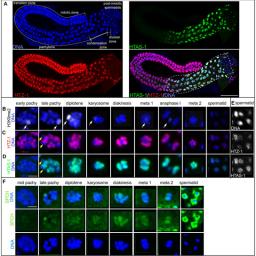Embryos Receive Parent-Specific Layers of Information
 Following up on last week's article about offspring and mothers' previous sexual partners (in insects, anyway), new research now sheds some additional light on the multi-layered process of how a sperm and egg pass along information needed for successful reproduction.
Following up on last week's article about offspring and mothers' previous sexual partners (in insects, anyway), new research now sheds some additional light on the multi-layered process of how a sperm and egg pass along information needed for successful reproduction.As described in an article published in the journal PLOS Genetics:
Though one layer is the DNA code that is transferred, the new study identifies information not encoded by DNA, a so-called "epigenetic" layer of information that helps the cell interpret the genetic code.In insects this additional "epigenetic" layer of information apparently can come from a previous mate. The question if such or similar mechanisms can also exist in higher organisms, e.g. also in humans, might be far fetched, but not that far, that it precludes a more thorough research. Clearly, there are still plenty of unknown factors in human and non-human reproduction: an area ripe for further research.
It's not too surprising, as it's a new enough field that probably every one of us were taught in school about strict DNA inheritance, with no room for other mechanisms like the emerging field of epigenetics.
http://www.pbs.org/wgbh/nova/body/epigenetics.html
Even experts have a hard time accepting it:
"Genetics. It turned out to be more complicated than we thought." --Laura Hercher
"My instinct is deep skepticism" --Kevin Mitchell
https://answersingenesis.org/genetics/epigenetics/epigenetic-changes-let-mice-inherit-their-fathers-fears/
But the fact that humans experience certain epigenetic effects has been rather firmly proven:
https://en.wikipedia.org/wiki/Epigenetics#Epigenetic_effects_in_humans